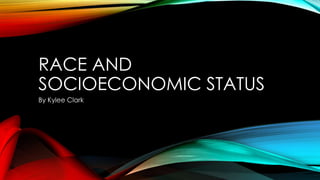
Race and socioeconomic status
- 1. RACE AND SOCIOECONOMIC STATUS By Kylee Clark
- 2. PROBLEM STATEMENT How does race* effect socioeconomic status? *Note race is being used instead of ethnicity because race is a social construct and I am looking for how people are perceived not the actual origins of a person.
- 3. OUTLINE For this project I am looking into the question of how does race effect socioeconomic status. Specifically I am looking at how race effects the ability to go to and complete college (an indicator of socioeconomic status). This question could go in many directions. I chose the indicator of college completion and education because it is relevant to me and the other people in this class since we are currently in school.
- 4. METHODOLOGY First off I am looking at different scholarly articles on race and education. This will help me figure out a basis on what is going on in the United States in general. Bellingham is just a small portion of the United States and will not be generalizable to the whole. Second, for my field work, I am going to survey college students and ask about their college experience. Since I am looking at the social construct of race I have decided I am not going to talk about their race instead I am going to link the answers with what I see.
- 5. FIELD WORK QUESTIONS Questions I will ask college students: • Are you using financial aid to complete your college experience? • Are your parents helping you pay for college? • If not, how are you paying for school? • What level of school do you wish to complete?
- 6. WHAT I FOUND IN MY RESEARCH I have found through my research that college education is very important in a persons socioeconomic status in the United States. This is an indicator of what type of job a person will be and socially, how a person is seen. College education is generational because of the loan process. When a person applies for financial aid to be able to get a loan there parents assets are looked at. If your parents do not have assets then you will not likely to be able to get the loan. Through this research in the United States, white people are more likely to be able to go to college and they have more life chances however, those who are black are less likely to get these chances. In the United States 13% of whites do not graduate high school while 21% of blacks do not graduate high school. This is a big difference and without high school a person can not go to college.
- 7. WHAT I FOUND IN MY FILED WORK My field work ended up being a little more difficult than I expected. In my research I found that most of the data is on blacks versus whites in socioeconomic status. However, there are mostly white people in Bellingham, there are not a lot of black people here. With this most of the white students I talked to were paying for education through working, financial aid and help from their parents. There were a wide variety of what level of education they wanted to complete. The results came to about half wanted to finish their AA and half wanted a BA with a few higher levels surveyed. The other category of race I found was Asian students. Most of these student’s parents were paying for their schooling. Also, they were going to higher levels of education. Mostly these students wants to get BA s and higher.
- 8. CONCLUSION My conclusion on what I learned is both what I expected and what I not what I expected. I learned from my research that with the categories of whites and blacks there is a huge difference between who can and cannot go to college. Unfortunately, this is what I expected. There is still a difference between races in the United States, even if we don’t want there to be one. During my field work I found that there is also a difference between races in the college world in Bellingham. This difference is mostly between whites and Asians. Asian students are more likely to be sent to school fully funded with a career focus. Whites are more likely to have to piece together funding for college and do not necessarily have as high of aspirations.
